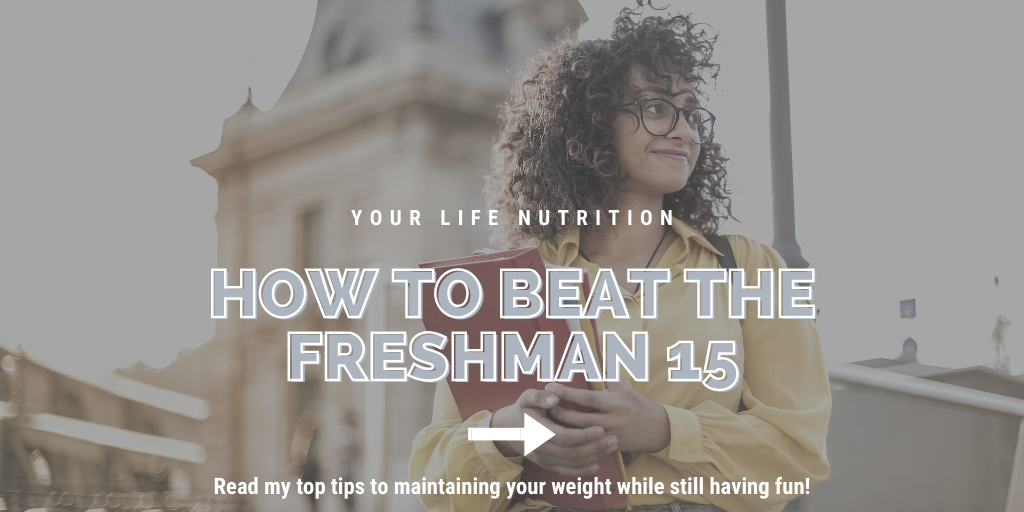Going off to college? This is such a fun and exciting time in life! It is also a BIG life change with changes in your eating patterns, food selections, activity, schedule and more! It can be easy to pack on unwanted weight gain if you aren’t careful. Be sure to set yourself up for a fun, healthy & successful year by checking out the tips below!
1. Be Aware of Liquid Calories
It can be so easy to wash down breakfast with some orange juice, sip on some soda at lunch, grab a caramel iced coffee to drink while doing some afternoon studying, and have some Gatorade during your intramural soccer game – before you know it, you just slurped down 800 calories just from beverages! Opt for zero calorie and zero sugar alternatives, like flavored sparkling water (like La Croix), unsweetened tea, or sugar free drink packets that are portable & can be easily added to water!
2. Stay Active & Buddy Up
One of the biggest reasons I see that students gain weight in college is because they were once active with their high school sports and activities, and then they get to college and are not participating in organized sports with practices multiple times a week. Then they get to college and are less active and eating the same as they used to, or are eating more, and the weight starts piling on. Being active when you get to college is huge when it comes to keeping up with your health! So try hitting up the rec center on campus to get active in the gym, on the track, in the pool or even the group fitness classes that are offered. Don’t have time for a workout, try and fit in some extra walking around campus during your day to keep your steps and activity up! Want to stay accountable with being active? Buddy up with your roommate or another friend and hold each other accountable for going to the gym a few days a week, or going on a walk together or maybe you hit up the same workout classes together. When you partner together, you are less likely to talk yourself out of a workout!
3. Join Intramural/Club Sports
Maybe you want to stay active in the sport that you love, but didn’t want the time and commitment of playing at the college level. Good news is, most colleges have intramural and club sports which still have organized practices and games that you can work into your schedule and meet others who love the sport like you do! When it comes to staying active, you’re most likely to stick to the exercise you enjoy doing! So if you played soccer in college, see if you can join the intramural team!
4. Manage Your Stress
Being a college student can be VERY stressful! I’ve been there – as an undergrad Dietetics student at Ashland University (Go Eagles!) I was juggling a lot of science classes, a full class load, studying many hours a day, member of the Triathlon team with weekly practices, attending youth group,working as a lifeguard at the rec center on campus and a tutor, all while trying to maintain a social life – I was stretched a bit thin! Not only the busyness, but the demand of studying, writing papers, completing papers and performing well especially to maintain a good GPA and scholarships can be stressful. That is why it is VERY important to have good stress relief tactics. This can look very different for everyone. Maybe you enjoy doing some leisure reading, playing a game of basketball, cracking open an adult coloring book, or going for a walk and getting some fresh air! Whatever it is, make sure you have some good non-food strategies to help relieve your stress. When I was in college, I definitely leaned on the Ben & Jerry’s, pizza and snacks quite a bit to soothe me as I studied, and this never actually solved my school problems, but it did contribute to me packing on 40# during my college career… so learn from my mistakes, and find some non-food ways to cope.
5. Drink Lots of Water
It can be easy to sit and study for hours and hours and not take a single sip! Dehydration can cause more headaches, low energy and lack of focus – ain’t nobody got time for that as a busy college study!
Not to mention, we get the same signal for hunger as we do thirst from the brain, but our automatic reaction is usually to think that we are hungry and we need to eat. Try drinking 8 ounces of water first, and wait 20 minutes to identify if you are still truly hungry or not. If you aren’t hungry anymore, your body probably just needed some water!
Drink at MINIMUM 64 ounces of water per day. But the ultimate goal would be to drink half of your body weight in water each day. For example, if you are 150 pounds, aim for 75 ounces of water per day. Think about getting a re-useable water bottle that you can take with you throughout the day and fill up to keep you hydrated!
6. Avoid Multitasking
We like to think that our bodies and brains are capable of multi-tasking, but the truth is, we can’t! Our brains can truly only focus on one task at a time. Eating while studying, reading etc. actually cause our brains to not focus on the food we are eating, which can make it difficult for us to actually figure out when we are satisfied or full, which can lead us to overeating without even realizing it. So, do what you can to treat eating and mealtimes as sacred, and as a true study break.
7. Get Enough Sleep
Our hunger hormones get thrown off when we do not get the rest we need. Which is why you can feel more hungry the next day after not getting enough rest. When we are not re-energized by a good night sleep, our bodies can seek energy through the form of food, which again can cause overeating and weight gain without even meaning to. Pulling all-nighters does not have to be apart of your college experience! If you manage your time well, you should be able to fit in your tasks, school work and extra curricular activities with time to get solid shut eye. Try and stick to a sleep schedule to get enough rest. So aim to get 7-8 hours of sleep per night! This will allow you to have energy to get through the long days of classes and long hours of studying.
8. Everything in Moderation
You can still enjoy your favorite foods and snacks while still losing weight or maintaining your weight! My top tips are to plan for these snacks and treats when you can by balancing the other food you eat and make other healthy choices throughout the day! If you have some chips or other snack foods, avoid eating out of the bags and instead put your portion in a bowl or on a plate to keep your portions in check instead of mindlessly eating and losing track of how much you had. Enjoy a night out with friends? Get back on track the next day with some lots of water, healthy food choices and a great workout!
9. Keep Healthy Snacks & Drinks in Your Dorm Room
Keeping healthy options in your dorm will prevent the need to hit up the not as healthy and more expensive options that are available in the vending machines or convenient store on campus. Stock up on water or zero-calorie drinks like flavored sparkling water, high protein/fiber snacks like nuts, peanut butter, fruits like apples, veggies and hummus, meat sticks, popcorn, protein bars and unsweetened applesauce pouches! Snacks can help fill in the gaps between meals, help keep you energized during the day and keep cravings at bay instead of waiting until your absolutely famished to hit up the dining hall when then it’s more difficult to make a healthy choice. Having a fridge in your dorm or apartment definitely allows for greater variety of healthy options like hummus, Greek yogurt, fruits and veggies!
10. Plan Ahead
Check out the dining hall menu ahead of time before you eat! This can help you to select a healthy choice before you are tired and hungry when you actually go to eat. Going to be away from your room for most of the day, pack some snacks to keep you fueled and energized throughout the day which can also help you avoid the more unhealthy options in the vending machine.
11. You Can Still Eat Well on a Budget
There are so many very inexpensive & shelf stable staples that you can keep on your dorm shelves and in your fridge! Think about keeping Greek yogurt, string cheese sticks, apples, carrots, and even pre-made hard boiled eggs in the fridge for some easy snacks and breakfasts. Stock up on peanut butter, oats, nut mix, canned fruits and veggies, roasted bean snacks and protein bars for some quick and shelf stable options for meals and snacks! If there is an Aldi nearby, this is an excellent spot to shop & save big bucks on groceries!
12. Talk to a Dietitian!
Confused on what to eat and when? Or notice that you are starting to gain that unwanted weight? Talk to a dietitian to learn about what your specific Nutrition needs are for your body and lifestyle! Many colleges have a dietitian on campus. Contact your campus health center or contact me, I’d love to chat!





